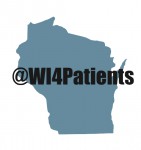WI Assembly Committee on Health Hears Legislation to Lower Prescription Costs by Protecting Patients from Harmful PBM Practices
MADISON, WI (February 6, 2020) – The Wisconsin Pharmacy Patient Protection Coalition (WPPPC), which represents patients, health groups, pharmacists and others negatively impacted by Pharmacy Benefit Managers (PBMs), today praised Wisconsin Assembly Committee on Health members for hearing testimony from patients and pharmacists alike to fix Wisconsin’s PBM problem.
“We are thankful to the state legislators who were willing to listen to testimony regarding the greater need for transparency in the prescription process for consumers,” said Danielle Womack, vice president of public affairs at the Pharmacy Society of Wisconsin. “Patients don’t want challenge and mystery at their pharmacy. Patients deserve choice, facts, transparency, and a pharmacist that can support their care. That’s why we need to reform and fix the PBM process in Wisconsin.”
During a late-night hearing on AB114, pharmacists from around the state packed the hearing room and legislators heard that affordability and accessibility to prescriptions are two of the biggest issues many patients have with the current PBM process.
According to the group, AB114 will hold PBMs accountable by requiring registration with the state; establishing price transparency requirements and eliminating intimidating gag clause provisions in PBM contracts with pharmacies, pharmacists, or health benefit plan sponsors. The bill and its Senate companion, SB100, also require PBMs to ensure patients are not denied coverage during a plan year if their medication/device was covered when the participant enrolled or renewed their coverage – often called non-medical switching.
“Ultimately, our concern is for the thousands of patients across Wisconsin who don’t realize that these mysterious middlemen or PBMs have been engaging in behind the scenes activities that drive up prescription costs and push people into mail-order delivery creating unnecessary delays and restricting access,” said Rob Gundermann, chair of the WPPPC and president and executive director of the Coalition of Wisconsin Aging and Health Groups. “This legislation is long overdue, and we need to fix Wisconsin’s PBM problem!
The Assembly committee expects to vote on AB114 next week and the Senate Committee on Health and Human Services will also hear public comments on companion bill SB100. A total of 99 cosponsors have signed onto the bi-partisan legislation supporting regulation of the PBMs. Primary sponsors of the bills include Representative Michael Schraa (R-Oshkosh) and Representative Debra Kolste (D-Janesville) and Senator Jon Erpenbach (D-Middleton) and Senator Roger Roth (R-Appleton). To view both bills and their support go to SB100 https://tinyurl.com/y484vh9s AB114 https://tinyurl.com/y223cdpc.
In September 2019, the WPPPC unveiled 11,000 signatures from Wisconsin patients calling on legislators to fix harmful PBM practices. Neighboring states like Minnesota, Iowa, Illinois, Michigan and others have reported PBMs overbilling hundreds of millions of dollars to patients.
Those interested in supporting the Wisconsin Pharmacy Patient Protection Coalition can follow the group on Twitter @WI4Patients, WI4 Patients Facebook and also view this video that further explains the PBM process https://tinyurl.com/y3el3gp7 Everyone is encouraged to send an email and/or call your local legislators https://maps.legis.wisconsin.gov/ to urge them to learn more and help protect Wisconsin consumers from greedy PBMs by supporting AB114 and SB100.
Members of the Wisconsin Pharmacy Patient Protection Coalition include: American Cancer Society Cancer Action Network; American Diabetes Association; AIDS Resource Center of Wisconsin; Coalition of Wisconsin Aging and Health Groups; Epilepsy Foundation; Great Lakes Hemophilia Foundation, Hometown Pharmacy; Lupus Foundation of America, Wisconsin Chapter; National Infusion Center; National Multiple Sclerosis Society; Pharmacy Society of Wisconsin; Wisconsin Alliance for Women’s Health; Wisconsin Medical Society, Wisconsin Rheumatology Association and the Wisconsin Association of Osteopathic Physicians & Surgeons.
NOTE: This press release was submitted to Urban Milwaukee and was not written by an Urban Milwaukee writer. While it is believed to be reliable, Urban Milwaukee does not guarantee its accuracy or completeness.





















